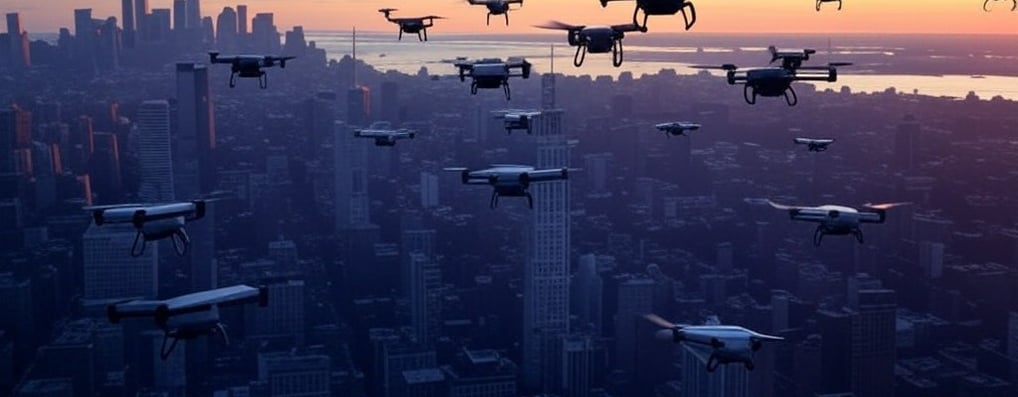Exploring the New Jersey drones.
I will be sharing the research that I have gathered over the past few weeks on the U.S Drones. Please enjoy my posts and feel free to contact me with any information you may have.
UFOS / TECH
Roos
1/4/20253 min read


New Jersey Drones
The Drone Debate: Surveillance Tool, Military Asset, or Something Else?
By Roos
Drones have transformed from niche technology into ubiquitous tools used by the military, corporations, and hobbyists. But as their presence grows, so does the unease surrounding their use, fueling speculation and debate across the spectrum.
Peoples thoughts on what this could be.
Mass surveillance.
Hobbyist.
Deep State activity.
Drones searching for a lost nuclear warhead from Ukraine.
Project Blue Beam.
Lost radioactive material the was possibly stolen during delivery.
Masking the presence of None Human Intelligence
Preparing us for disclosure early Janurary.
The Government’s Perspective
Federal agencies defend drone technology as an essential asset for national security, disaster response, and law enforcement. According to the Department of Homeland Security (DHS), drones aid in border surveillance, disaster relief, and search-and-rescue operations. The military, too, relies on Unmanned Aerial Vehicles (UAVs) for intelligence gathering and precision strikes, framing drones as critical tools in modern warfare.
In civilian applications, the Federal Aviation Administration (FAA) has sought to regulate drone usage to ensure airspace safety. Officials have repeatedly assured the public that surveillance drones operated by the government are deployed with strict oversight. According to a 2023 report from the Office of the Director of National Intelligence (ODNI), any domestic surveillance involving drones adheres to constitutional protections, with warrants required for intrusive operations.
The Public Response
Despite government reassurances, skepticism abounds. A Pew Research poll in 2023 revealed that 58% of Americans harbor concerns about drones’ potential to infringe on privacy rights. Many citizens have reported sightings of unidentified drones hovering over residential neighborhoods, sparking questions about who is operating them and for what purpose.
Civil liberties groups like the American Civil Liberties Union (ACLU) argue that the current regulatory framework is inadequate to prevent abuse. “There’s insufficient transparency about how drones are being used and by whom,” an ACLU spokesperson told the New York Times. The organization advocates for stricter limits on drone surveillance to prevent unwarranted monitoring of citizens.
Conspiracy Theories and Speculation
Where ambiguity exists, conspiracy theories flourish. Online forums and social media platforms teem with claims that drones are tools of the "Deep State." Some theorists allege that drones are part of a mass surveillance program designed to spy on dissenters or monitor civilian activity on a grand scale.
Others take the theories further, speculating about clandestine uses of drones. Common claims include:
Mind-control experiments: Some allege drones are equipped with technologies to emit low-frequency waves aimed at influencing public behavior.
Monitoring extraterrestrial activity: A subset of UFO enthusiasts claims that certain drones are government-operated to obscure or track alien activity.
Weaponization against civilians: Theories suggest that militarized drones could one day be used to suppress dissent or protests, their persistence reflects widespread distrust in governmental institutions and the opaque nature of drone operations.
Alternative Possibilities
Amidst the debate, it’s worth considering other possibilities:
Corporate Use: Private companies increasingly employ drones for delivery services, agriculture, and infrastructure inspections. Could some sightings be attributed to private sector activities rather than government surveillance?
Foreign Surveillance: In 2022, reports of Chinese-manufactured drones near sensitive sites raised alarms about espionage. Are some drones operated by foreign powers rather than domestic entities?
Hobbyist Misinterpretation: The rise of recreational drones has led to a surge in unidentified aerial sightings. Many drone operators inadvertently spark suspicion by flying in restricted or populated areas.
What do I think?
Drones are increasingly suspected of being tools for data collection, raising questions about privacy and security. One of the most overlooked vulnerabilities lies in radio frequency (RF) hacking, a niche that remains largely unregulated and highly exploitable.
Drones are potentially gathering vast amounts of information, including:
Intercepting Communications: Equipped with RF sniffers, drones could intercept signals from phones, Wi-Fi, and other devices, capturing sensitive metadata or encryption keys.
Behavioral Tracking: High-resolution cameras and thermal imaging may allow drones to study human movement patterns, traffic flows, or even group activities, possibly for surveillance or experimental AI systems.
Corporate Espionage: By exploiting RF vulnerabilities, drones could infiltrate private networks, extracting valuable data from unsuspecting targets.
The Danger of Vulnerability
RF systems, unlike traditional cybersecurity frameworks, are especially prone to exploitation. Drones’ mobility and anonymity make them ideal tools for:
Mass Data Harvesting: Large-scale collection of private communications.
Espionage: Stealing sensitive corporate or military information.
Behavioral Monitoring: Testing facial recognition or AI systems without public consent.
This gap in oversight leaves the technology at a critical juncture, where innovation could either enhance society or erode trust and privacy. Are drones silently collecting data about our lives? And if so, who is controlling the information?
What’s your take on drones? Are they a benefit or a threat?
